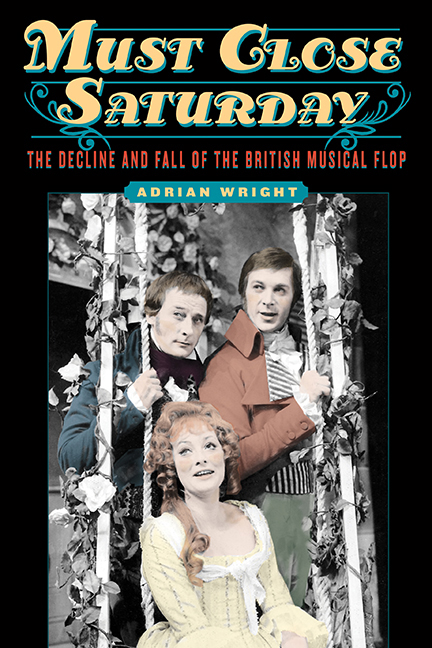Book contents
- Frontmatter
- Contents
- List of Illustrations
- Preface and Acknowledgements
- 1960
- 1961–1964
- 1965–1966
- 1967–1969
- 1970–1972
- 1973–1976
- 1977–1979
- 1980–1983
- 1984–1989
- 1990–1999
- 2000–2005
- 2006–2016
- Appendix: British Musical Flops in London 1960–2016
- Notes to the Text
- Select Bibliography
- Index of Musical Works
- General Index
- Frontmatter
- Contents
- List of Illustrations
- Preface and Acknowledgements
- 1960
- 1961–1964
- 1965–1966
- 1967–1969
- 1970–1972
- 1973–1976
- 1977–1979
- 1980–1983
- 1984–1989
- 1990–1999
- 2000–2005
- 2006–2016
- Appendix: British Musical Flops in London 1960–2016
- Notes to the Text
- Select Bibliography
- Index of Musical Works
- General Index
Summary
‘So wholesome, so naïve, so worthy that one feels rather like a villain in a Victorian melodrama for disliking it so much’
Evening Standard on High Diplomacy1967: Queenie Mrs Wilson's Diary
In the 1960s, transatlantic collaboration in the writing of British musicals was rare. Queenie (Comedy Theatre, 22 June 1967; 20) was rarer still, the only British musical written in rhyming verse by perhaps the unlikeliest of poets, Ted Willis, best known as the creator of the long-running TV series Dixon of Dock Green [‘Evenin’ all.’]. Purportedly inspired by Willis's 1948 play (and subsequent 1958 film) about a working-class family's struggle, No Trees in the Street, Queenie bore some resemblance to a TV series Willis had created in 1964, The Four Seasons of Rosie Carr, a sort of family saga with Rosie starting off as barmaid. By 1967, Rosie had become Queenie Swann (Vivienne Martin), London publican of ‘The Queen of Sheba’ and widow, courted by a little collection of suitors, from which she finally selects ex-sailor barman James (Kevin Colson) as mate. After scrapping his first draft, Willis was encouraged to continue by impresario Arthur Lewis. Lewis was probably responsible for linking Willis up with two American musicians. Dick Manning's credits included writing the Perry Como hit ‘Hot Diggity’ and in 1944 composing the first musical to be performed in full on American television, The Boys From Boise. Marvin Laird was already known as a Broadway arranger from 1965, and would go on to later success as a composer with the off-Broadway Ruthless! in 1992. Meanwhile, Manning and Laird worked at setting Willis's lyrics, sent on tape from his home in Chislehurst.
Directed by Lewis and designed by the prolific Hutchinson Scott, Willis's piece first played at Guildford as The Ballad of Queenie Swann, before being presented in London by Lewis and Bernard Delfont. It was strongly cast, with Queenie's lovers played by Colson, Bill Owen, Simon Oates and Paul Eddington, Eddington taking many of the reviews as a punctilious undertaker (Lady thought him ‘the most amusing thing in an unpretentious night’), with attractive juveniles Cheryl Kennedy and Neil Fitzwilliam. Almost incidentally, Queenie was yet another halfhearted attempt to establish Vivienne Martin as a British musical star.
- Type
- Chapter
- Information
- Must Close SaturdayThe Decline and Fall of the British Musical Flop, pp. 62 - 80Publisher: Boydell & BrewerPrint publication year: 2017

